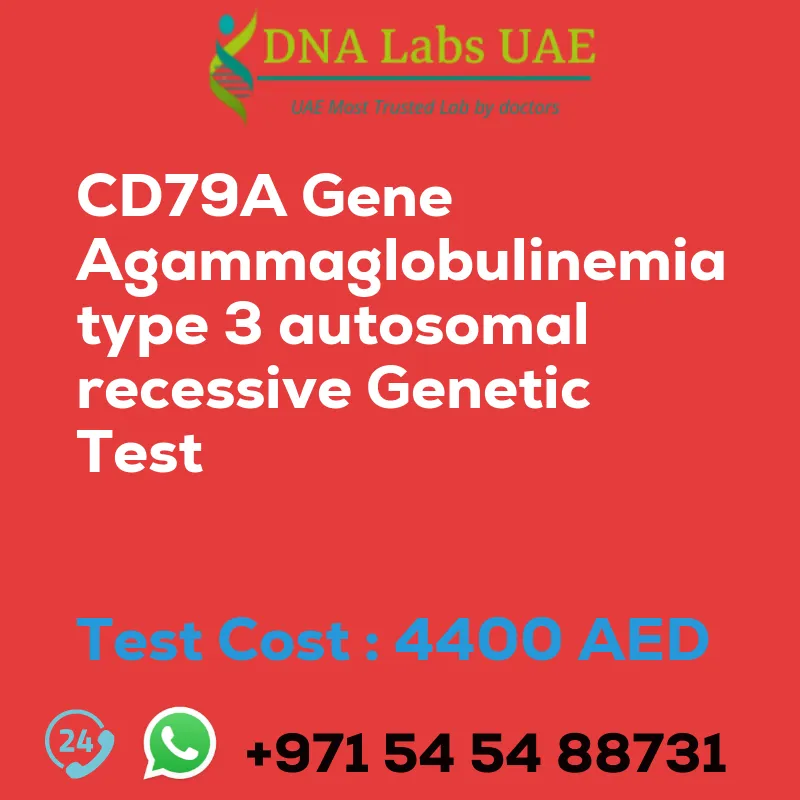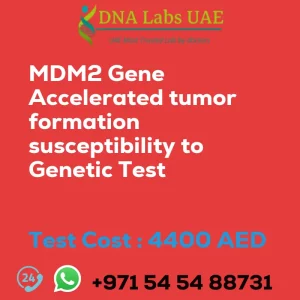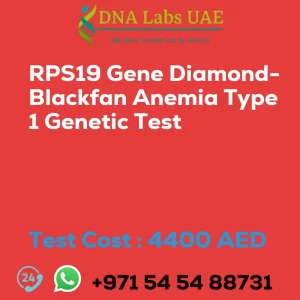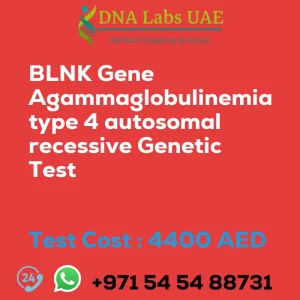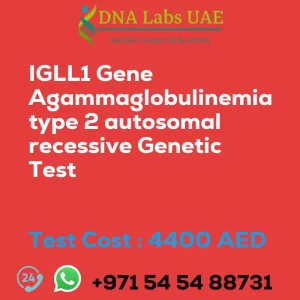CD79A Gene Agammaglobulinemia Type 3 Autosomal Recessive Genetic Test
Test Details
CD79A gene agammaglobulinemia type 3 is a rare genetic disorder characterized by a deficiency of B cells, which are responsible for producing antibodies. This condition is inherited in an autosomal recessive manner, meaning that an individual must inherit two copies of the mutated CD79A gene, one from each parent, to develop the disorder.
NGS (Next-Generation Sequencing) genetic testing is a diagnostic tool used to identify mutations in genes associated with various genetic disorders, including CD79A gene agammaglobulinemia type 3. This type of testing involves sequencing the DNA of an individual to identify any genetic variants or mutations that may be present. By identifying mutations in the CD79A gene, NGS genetic testing can confirm a diagnosis of agammaglobulinemia type 3 and help guide treatment decisions. Additionally, it can also be used for carrier testing in individuals with a family history of the disorder to determine their risk of passing the mutated gene to their children.
It is important to note that NGS genetic testing should be performed by a qualified healthcare professional or genetic counselor who can interpret the results and provide appropriate genetic counseling and guidance.
Test Name: CD79A Gene Agammaglobulinemia Type 3 Autosomal Recessive Genetic Test
Components:
- Price: 4400.0 AED
- Sample Condition: Blood or Extracted DNA or One drop Blood on FTA Card
- Report Delivery: 3 to 4 Weeks
- Method: NGS Technology
- Test Type: Hematology
- Doctor: Hematologist
- Test Department: Genetics
Pre Test Information:
Clinical History of Patient who is going for CD79A Gene Agammaglobulinemia type 3, autosomal recessive NGS Genetic DNA Test. A Genetic Counselling session to draw a pedigree chart of family members affected with CD79A Gene Agammaglobulinemia type 3, autosomal recessive NGS Genetic DNA Test gene CD79A.
Test Details:
CD79A gene agammaglobulinemia type 3 is a rare genetic disorder characterized by a deficiency of B cells, which are responsible for producing antibodies. This condition is inherited in an autosomal recessive manner, meaning that an individual must inherit two copies of the mutated CD79A gene, one from each parent, to develop the disorder. NGS (Next-Generation Sequencing) genetic testing is a diagnostic tool used to identify mutations in genes associated with various genetic disorders, including CD79A gene agammaglobulinemia type 3. This type of testing involves sequencing the DNA of an individual to identify any genetic variants or mutations that may be present. By identifying mutations in the CD79A gene, NGS genetic testing can confirm a diagnosis of agammaglobulinemia type 3 and help guide treatment decisions. Additionally, it can also be used for carrier testing in individuals with a family history of the disorder to determine their risk of passing the mutated gene to their children. It is important to note that NGS genetic testing should be performed by a qualified healthcare professional or genetic counselor who can interpret the results and provide appropriate genetic counseling and guidance.
| Test Name | CD79A Gene Agammaglobulinemia type 3 autosomal recessive Genetic Test |
|---|---|
| Components | |
| Price | 4400.0 AED |
| Sample Condition | Blood or Extracted DNA or One drop Blood on FTA Card |
| Report Delivery | 3 to 4 Weeks |
| Method | NGS Technology |
| Test type | Hematology |
| Doctor | Hematologist |
| Test Department: | Genetics |
| Pre Test Information | Clinical History of Patient who is going for CD79A Gene Agammaglobulinemia type 3, autosomal recessive NGS Genetic DNA Test. A Genetic Counselling session to draw a pedigree chart of family members affected with CD79A Gene Agammaglobulinemia type 3, autosomal recessive NGS Genetic DNA Test gene CD79A |
| Test Details |
CD79A gene agammaglobulinemia type 3 is a rare genetic disorder characterized by a deficiency of B cells, which are responsible for producing antibodies. This condition is inherited in an autosomal recessive manner, meaning that an individual must inherit two copies of the mutated CD79A gene, one from each parent, to develop the disorder. NGS (Next-Generation Sequencing) genetic testing is a diagnostic tool used to identify mutations in genes associated with various genetic disorders, including CD79A gene agammaglobulinemia type 3. This type of testing involves sequencing the DNA of an individual to identify any genetic variants or mutations that may be present. By identifying mutations in the CD79A gene, NGS genetic testing can confirm a diagnosis of agammaglobulinemia type 3 and help guide treatment decisions. Additionally, it can also be used for carrier testing in individuals with a family history of the disorder to determine their risk of passing the mutated gene to their children. It is important to note that NGS genetic testing should be performed by a qualified healthcare professional or genetic counselor who can interpret the results and provide appropriate genetic counseling and guidance. |

